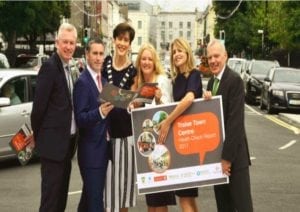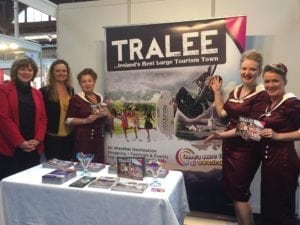Ireland’s towns check their pulse

As Ireland’s economy continues to recover, can collaborative ‘Town Centre Health Checks’ facilitate a renaissance in our towns? Paulie Doyle reports
15 June 2018
A new collaborative initiative undertaken by The Retail Grocery Dairy & Allied Trades Association (RGDATA) and the Irish Heritage Council (IHC) is assessing the historic centres of a selection of Ireland’s larger regional towns, with ambitions to roll out the pilot programme nationwide .
So-called ‘Town Centre Health Checks’ (TCHCs) are commonplace across the EU, and widely accepted as a useful mechanism for indentifying and tackling obstacles to promoting enterprise, tourism and commerce in towns and cities.
RGDATA’s initiative, which was begun in 2016, is based on a collaborative approach. It has seen voluntary, public, and private sectors from eight Irish towns take part, all of them sharing the aim of improving conditions for businesses, residents, and visitors.
Towns which ultimately participated in the programme included Ballina, Cashel, Ennis, Dundalk, Monaghan, Naas, Rush, and Tralee.
Evidence-based planning
The Irish economy continues to see improvement, with Ibec predicting growth of up to 4.2% in the next 12 months. Yet, outside of major cities, some smaller towns – and in particular their town centres – are facing challenges associated with regeneration in parallel with restructuring in the retail industry. This includes derelict premises and buildings, lack of parking spaces, issues with urban planning, a decline in footfall, and the emergence of e-commerce.
Some have become ‘doughnut towns’; a scenario in which economic development occurs at a town’s edges, leaving a hollow, enterprise-and-commerce-free centre.
Outlining the initiative, Alison Harvey, from the Heritage Council, points out that the Irish model is at the fore of a training and capacity-building programme. “It will provide each participating town’s key stakeholders with useful collaborative tools,” she says, “and a framework for strategic management and planning.”
Once a town centre’s main issues have been identified, a collective approach can be established for dealing with them. “Local authorities, local chambers, universities, ITs and civic groups are all involved,” Harvey says. “The planning in these towns will be improved by our research; there will be more robust evidence-based town planning, based on the work that has been done.”
According to a pilot feedback report prepared by the Heritage Council last year, the ambition is ultimately to develop an “innovative, town centre-led retail, cultural, heritage, community and tourism baseline, which is recognised internationally as a best practice collaborative development model”.
Broadly speaking, the health checks identified a need for wide-reaching support from the Irish government and other state agencies to assist collaborations between a town’s four pillars; local authorities, chambers of commerce, local civic groups, and third level institutions.
The report also recommended the establishment of a central Project Support Office (PSO), which should have “a realistic multi-annual budget(…)for a ‘full’ national TCHC training programme in order to share services/resources, foster exchange (including international exchange) and keep costs to a minimum.”
Harvey says that the Local Government Reform Act 2014, which resulted in many Irish towns losing their town councils, has resulted in some difficulty in the past number of years with regard to the management of towns. She and others involved in the pilot are hoping that this new initiative might fill some of the gaps and create much-needed new management structures.
“We’ve stepped in and tried to facilitate regeneration, and hopefully the creation of new engines for growth in our towns that have been struggling,” she says.
Tralee gets a check-up

Kieran Ruttlidge, Tralee Chamber of Commerce; Damien English TD; Mayor Norma Foley; Alison Harvey, Irish Heritage Council; Martha Farrell, IT Tralee; Mick Scannell, Kerry County Council (Photography credit: Dominick Walsh Photography)
Tralee, along with Ennis, served as case studies for the initiative, and Tralee mayor Norma Foley says she was happy with the results. “It’s a brave town that puts itself forward for a health check,” she says, speaking to ShelfLife. “But the experience was hugely positive, and I would highly recommend that other towns get involved.”
In Tralee, 100 businesses were approached to take part in the research, with 69 ultimately participating. When asked for their ideas to improve their town centre, business owners suggested that efforts could be made to fill vacant units, and provide more parking to facilitate increased footfall. From a consumer perspective, interest was expressed in some shops having later opening hours, with one-third of respondents wanting later openings on Fridays.
“It really gave us the opportunity to see the benefits of a collaborative approach, having key stakeholders who are invested in progressing the town all come together to envisage how and where we’d like to go in the future. Formulating an action plan, and implementing it,” mayor Foley continues.
The results of the Tralee case study showed that 78% of business respondents felt that shopping was the primary attraction for people visiting a centre, with 60% of them going as far as saying that shopping is their town centre’s main strength.
Also identified was a desire for more public events for potential consumers, and tourists, something that Tralee will now take action to make a reality. “Now that we have the data, we’re also looking at what we have available to people who are visiting the town,” the mayor says.
“We’d love to broaden our events scheme. People wanted more music events, outdoor markets, things like that, and these are all things now that we’ll be feeding into, and trying to facilitate going forward.”
The number of events that take place will depend on securing funding. “Any of the best initiatives that have taken place in the town have come from government funding or European investment,” Foley says, “and we are keen to progress that too.”
Also on board was IT Tralee, whose students helped as part of a research programme. “We were approached by Kerry County Council, who we would have worked with previously in this context, and they asked us to take this on board,” explains Marth Farrell, a marketing lecturer from IT Tralee.
“And it’s certainly it’s in our interest to have a healthy town centre, so we said we’d be happy to do it.”
About 15 students in total took part. Their involvement, she says, helped with the accumulation of evidence that can inform redevelopment of their town. They also gained valuable on-the-job experience doing research – further utility derived from the initiative.
“From an academic development point of view it was great,” she adds. “Through this project, they now have skills and competencies that they previously did not have, which, in the long term, will further facilitate enterprise and commerce in the town.”
Town centres and the digital space

Representatives from the Tralee Chamber Alliance at the recent Active Retirement Ireland Trade & Tourism Show in Dublin’s RDS, including Michele from The Rose Hotel, Heather from Meadowlands Tralee and The Charming Soubrettes (Source: Facebook)
The role of the digital space in facilitating vibrant and thriving town centres was also identified by the report. This was something that Tralee’s businesses could definitely build up: “Something that really stood out was the role that online presence could have in helping businesses in town centres,” she continues.
Shoppers felt as though high street brands were missing in their town, with some of the brands mentioned reflecting an increasing trend of online shopping. Around 40% of respondents shopped online at least once per month, with 68% saying that they mostly purchased clothing and accessories. The report also suggested training for some Tralee businesses so that online presence, from both an e-commerce and a social media marketing perspective, could be improved.
Ken Tobin from the Tralee Chamber of Commerce, who also participated in the initiative, agrees with this assessment. “What is needed,” Tobin says, “is marketing and support for local businesses, and an array of training programmes for local businesses to help them get online and promote themselves.” he says.
Online shopping has increased exponentially in Ireland since 2007. According to data accumulated by Euromonitor, Irish people are fifth in the world when it comes to internet shopping. Last year, Ireland spent more than €700 online per capita on the web. “Businesses that are bricks and mortar need to adapt to the online world. It’s about offering an experience, and promoting that in a very strong way to customers,” Tobin adds.
A nationwide health check programme?
Ultimately, the group says that it would like to see every town in Ireland get its health checked as part of a nationwide initiative under the National Development Plan 2018 – 2027.
“We believe that a full programme under the NDP would help a lot of towns get to the point of doing a collaborative town centre health check for the first time,” explains RGDATA Director General Tara Buckley.
Although RGDATA looks after the interests of retailers, Buckley adds that maintaining the cross-disciplinary approach of the initiative will be essential for success when rolling out across the country. RGDATA and the Heritage Council have been working closely with three government departments: the Department of Housing, Planning and Local Government, the Department of Culture, Heritage and the Gaeltacht, and the Department of Rural and Community Development – all of which support the pilot initiative, and are keen to see collaborative Town Centre Health Checks rolled out across the country.
In addition, as Brexit looms in March 2019, RGDATA and the IHC also plan to deliver a workshop to assess the health of Ireland’s border towns this June, with the hope that partners can facilitate preparation for some of the socio-economic and cultural consequences of Britain leaving the European Union.
These partners also plan to hold a second workshop later in the year for towns along the Wild Atlantic Way/Atlantic Economic Corridor (AEC). It is envisaged that the National Development Plan will support all of these worthwhile regeneration events, collaborative Town Centre Health Checks, subsequent action plans, and projects identified as being necessary to ensure that Ireland’s town centres remain viable.
For more information on the initiative, contact:
Alison Harvey, Irish Heritage Council – aharvey@heritagecouncil.ie
Tara Buckley, RGDATA – tbuckley@rgdata.ie



 Print
Print






Fans 0
Followers